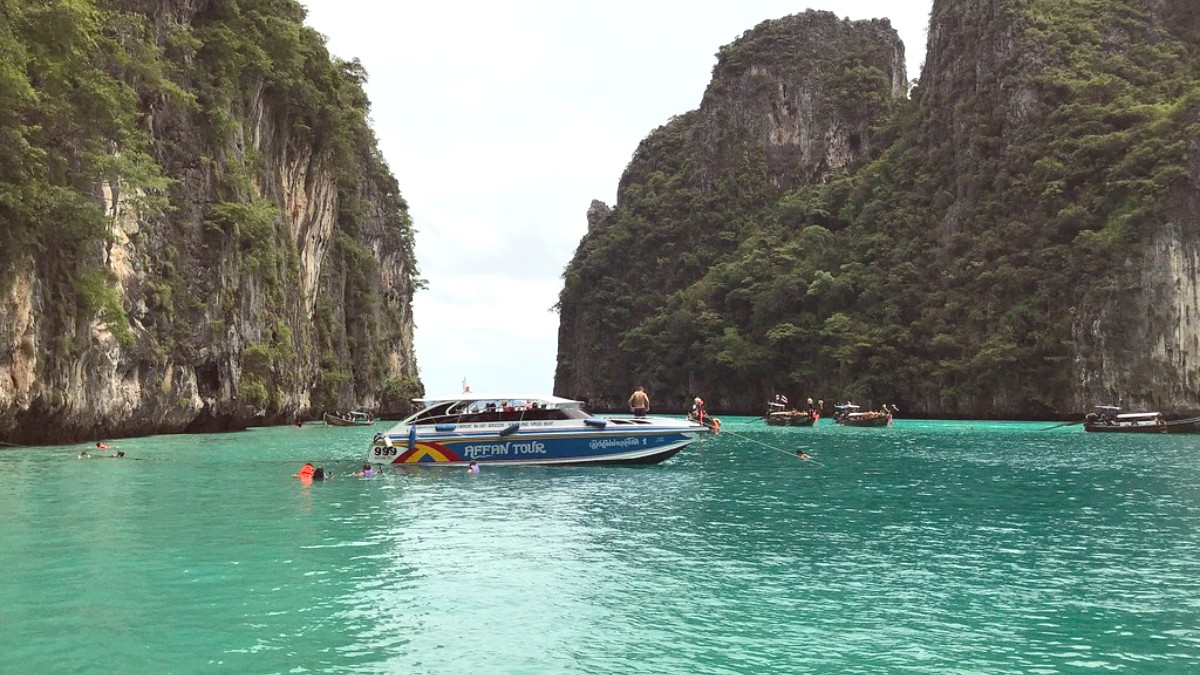
Andaman Coast, Thailand
Khao Phra Thaeo National Park protects the island's last remaining rainforest. It plays a role in conserving local biodiversity and water sources.
Marine National Parks (Similan, Surin, Hat Nopharat Thara-Mu Ko Phi Phi) are critical for marine biodiversity. Adhere to strict visitor regulations.
The Gibbon Rehabilitation Project (GRP) focuses on rescuing, rehabilitating, and releasing gibbons back into the wild.
Your actions can contribute to preserving Phuket's unique environment.
Thailand faces challenges with plastic waste. While some hotels may have recycling bins, widespread public recycling infrastructure remains limited.
Phuket relies on rainfall and reservoirs for its water supply. Water scarcity becomes an issue during the dry season. Be mindful of your water usage.
Consider contributing to carbon offset programs through your airline or independent organizations for your flights. This helps mitigate the environmental footprint of air travel.
Look for accommodations with environmental certifications or clear sustainable practices (energy efficiency, waste reduction, water conservation, local sourcing). Choose tour operators who prioritize ethical animal interactions.
For durable and ethically sourced outdoor gear, consider exploring products from Patagonia. Their commitment to environmental activism is strong.
Visit PatagoniaSupport conservation efforts and find unique items by visiting The Rainforest Site (GreaterGood). Purchases contribute to preserving rainforests.
Explore The Rainforest SitePractice respectful interactions to honor local traditions and customs.
The ongoing preservation of Sino-Portuguese architecture in Phuket Old Town marks a significant cultural preservation effort. Support businesses that contribute to this heritage.
Dress modestly, especially when visiting temples, religious sites, or local communities. Cover your shoulders and knees. Remove shoes before entering temples, private homes, and sometimes certain shops.
Always ask permission before taking photos of people, especially children or members of tribal communities. Be respectful of privacy, especially in residential areas or during private ceremonies.
Shoulders and knees must be covered for both men and women. Always remove your shoes before entering temple buildings or prayer areas. Maintain a respectful silence, especially in prayer areas or during ceremonies.
A few simple gestures reflect deep respect for Thai culture.
Show deference to older individuals through polite language and gestures like a slight bow.
A smile can bridge many gaps. Avoid expressing anger or frustration openly.
Pay attention to local behavior and adapt your actions accordingly.
Responsible tourism helps ensure that your travel benefits local communities.
While less prevalent directly in Phuket Town, seek out tours or experiences that directly benefit local communities.
Look for shops that promote fair trade practices for local crafts and products. This ensures artisans receive fair compensation for their work. Avoid buying counterfeit goods, as this supports illegal industries.
Choose to support local businesses over large international chains where possible. This includes independent restaurants, shops, and tour operators.
Avoid activities that involve animal exploitation. This includes elephant riding, tiger temples, or animal shows where animals perform unnatural tricks. Choose ethical sanctuaries focused on animal welfare and rehabilitation.
Be vigilant and report any suspected child exploitation to local authorities or NGOs. Do not support businesses that facilitate it. While often heartbreaking, giving money directly to child beggars can perpetuate cycles of poverty.
Ensure your travel choices uplift rather than diminish local communities. Be aware of hidden forms of exploitation.
Stay alert to common tourist scams, specifically those involving children or animals, and report them.